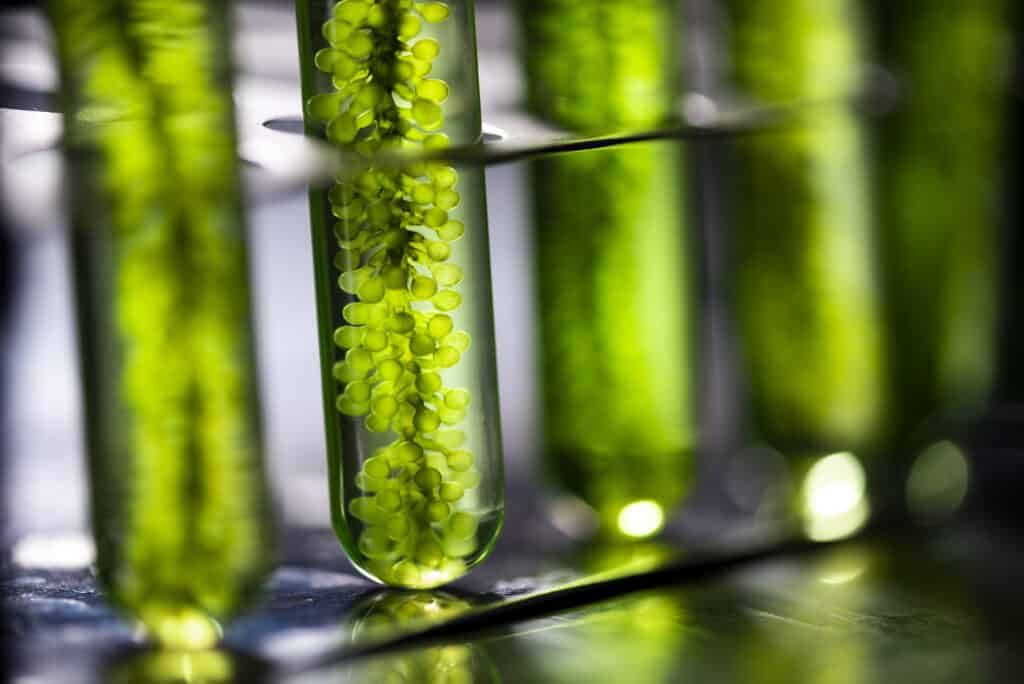After the first part of this blog article focused on general information about one of the oldest plants on earth as well as its possible applications in medicine, pharmaceuticals, cosmetics and as food, the following article deals with the potential of algae in research and industry.
Algae in research
Science is particularly interested in the climate effect of algae. The plants actually cool the climate. Their effect is particularly strong around the oceans of the southern hemisphere, as heat stimulates algae to form more sulphur and clouds: less sunshine, more clouds – the atmosphere cools down. In addition, the algae partly counteract the greenhouse effect. They extract carbon dioxide from the atmosphere and bind it into organic matter. Algae convert three times more CO2 than crops. Research has also shown that green algae can break down PET into its basic building blocks. These could then be used to produce new plastics – a solution to the global problems of microplastics and plastic waste?
Algae in industry
In addition to all the advantages already mentioned, the plants will also cover the energy requirements in the future. For this purpose, the biomass of the rapidly proliferating brown algae is separated into bioethanol and methane. These components can be used as fuel or to generate heat (biogas).
The industry’s immense interest in algae is no accident: after all, they produce about 30 times more oil than rapeseed or maize. And for biofuel, these plants have so far been used in the same way as sugar cane and grain. For all these plants, however, arable land is needed, which is becoming scarce in view of the rising population figures. Dr. Andreas Helget, Managing Director of Yokogawa Deutschland GmbH, had already addressed this issue in his regular column.
Mineral oil giants invest
This is another advantage of algae: they only need nutrients, light, water and carbon dioxide. This means that scientific and commercial interest in the use of algae for the production of bioenergy and in biotechnology is growing. It is not for nothing, for example, that the major players in the mineral oil industry, such as BP and Shell, have been investing in the energy plant for years with an eye to efficient biofuels. Yokogawa has also been active in this field for a long time and has entered into a strategic partnership with microalgae specialist Alga Energy.
However, the quality is not (yet) sufficient to produce the desired fuel. However, research is constantly continuing in order to achieve the necessary higher fat content of the plant through improved processes. Currently, the plant and operating costs are too expensive to make a profit with biofuel from algae.
More effective than a wastewater treatment plant
Another advantage of the “jack of all trades” algae is the possibility it offers in terms of wastewater treatment. This is because the plants can be used to bind washed out fertilizers and can themselves be reused as algae fertilizers. As with other plants, carbon dioxide (CO2) can be bound with their help. They are also suitable for drinking water disinfection in the rural sector. With this process it is possible to clean wastewater from agriculture and industry. More effective than in a conventional wastewater treatment plant – at least that is what entrepreneurs and scientists believe. Researchers at the Technical University of Munich recently even reported innovative materials made from algae with carbon fibres made from algae, which are said to be lighter than aluminium and stronger than steel.
The algae: A real jack-of-all-trades.
Algae: A jack-of-all-trades with enormous potential and a bad reputation 1/2
“We must not blame technology for everything” – Interview with IMK Manager Werner Worringen
Digital Transformation – more than just a technological change




